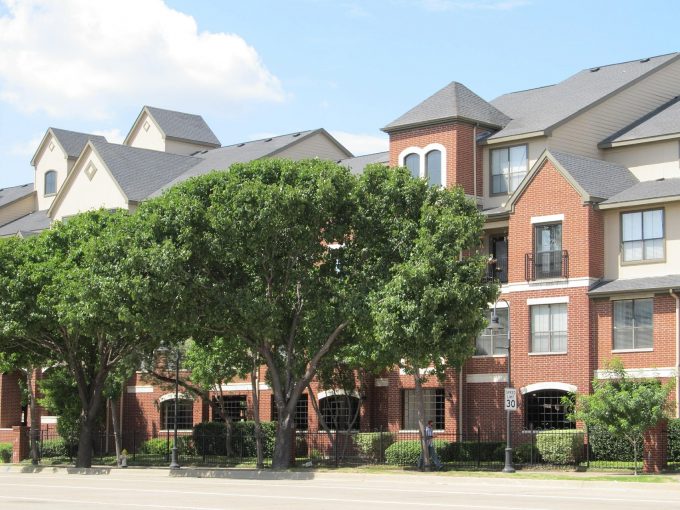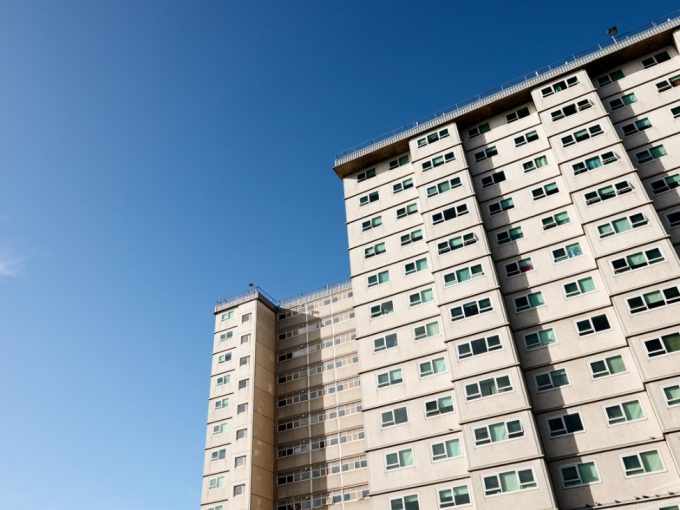RMIT urban researchers will lead a pioneering project examining how Australia’s housing sector can transition to a circular economy for more sustainable homes.
From urban wellbeing and public health to urban planning and housing, RMIT researchers are helping to build age-friendly cities across Europe and Australia.
Australia’s emerging build-to-rent sector is growing — “booming” by some accounts with a 70% jump in value in the past year.
A new study examining Victorians’ lived experience during COVID-19 points to the design and quality of homes and neighbourhoods as a key mitigating factor in people’s capacity to cope with disasters.
RMIT economists are calling for a rethink in retirement financing in a new first of its kind report which reveals that more older Australians are using reverse mortgages to pay off debt.
Pragmatic housing design features are vital to enable older people to stay home longer, have greater independence and reduce the cost of age care services, according to new RMIT University research.
Stay-at-home orders and the economic crisis have increased the burden of energy costs on lower-income Australians. Poor housing quality and unequal access to home energy efficiency are hurting our most vulnerable households.
RMIT urban researchers have received funding from the Australian Housing and Urban Research Institute to investigate COVID-19’s impact on housing stress in Melbourne.
How policy makers regard and manage the ownership and use of land has profound consequences for the affordability of our homes and the inclusiveness of our neighbourhoods.
In this coronavirus “war”, governments should take inspiration from the past and again implement rent control.
As our cities evolve, so too should our approach to building and planning our urban habitats. Here, six RMIT urban researchers share how their work is shaping how we live in our cities and with nature.
In the year since the Australian government created the National Housing Finance and Investment Corporation (NHFIC), its bond aggregator, AHBA, has raised funds for affordable housing providers, allowing them to refinance loans under better conditions.
Australia was already one of the most urbanised nations by the end of the 19th century. Unlike European and North American countries, Australia’s pattern of settlement did not have a neat urban hierarchy. The gap between the large and small towns was huge.
With rising energy bills the new normal, we need to focus on improving Victoria’s housing stock to help householders adapt. New research in Moreland is exploring the barriers and opportunities householders face in improving their homes.
A new report raises concerns that rising mortgage debt and falling home ownership rates in later life are undermining the role of home ownership in supporting retirees’ financial wellbeing.
People experiencing homelessness and poor mental health are among Australia’s most vulnerable citizens. Without secure housing and an accessible mental healthcare system, recovery from mental illness is seriously compromised.
Australia will need another 730,000 social housing dwellings in 20 years if it is to tackle homelessness and housing stress among low-income renters.
Successful economies are characterised by growth, so how can “degrowth” in our cities and housing possibly be good for us? Urban academic Anitra Nelson explains.
As house prices subside from recent record highs, Australians are struggling to obtain the housing they need to be as healthy, well and secure as they could be yet many Australians have no home at all.
Despite recent falls in the housing market, housing costs and indebtedness bite deeply into household budgets, especially at Christmas time.
As our state’s numbers grow, we need plan how we accommodate every person. Here, our experts provide their insights on the critical challenges facing Melbourne’s housing needs.
Australia needs to triple its small stock of social housing over the next 20 years to cover both the existing backlog and newly emerging need.
Australia needs to triple the amount of social housing built over the next 20 years if it is to meet future demands, a new study has found.
Here our experts share everything you need to know about how policymakers can make Melbourne more liveable, improve our liveability, reduce commuter crushes and increase housing affordability.
Until now, the majority of older people in Australia have achieved the goal of owning their own home outright. Hence, policymakers have typically shown little concern about the size and budget costs of rental housing assistance programs for seniors.
New housing supply is simply not expanding affordable housing opportunities for the poor in a way that reduces the homelessness count.
The recent Reserve Bank of Australia report The Effect of Zoning on Housing Prices put forward the argument that restrictive zoning is driving Australian house prices up - particularly in Melbourne and Sydney - arguing that that planning policy reform is necessary in order to meet projected population increases.
The number of people experiencing homelessness and the rate of homelessness have both increased. Our research points to problems in the public housing system as one of the more important causes of these increases.
The population of people aged 65 and over in Australia is projected to grow from 3.7 million to 8.7 million by 2056. Cities, towns and housing need to be designed to help people stay at home as they age.
For the first time, a new study led by RMIT University and the City of Melbourne has quantified the economic and social impact of investment in the arts.
The baby bonus did its job, encouraging people to have more children at a time when fertility rates were low, our research finds. Given Australian men and women desire 1.5 more children than they actually have, it might be time to consider policies like this again.
Rising mortgage debt is affecting everything from employment to spending, as Australians approach retirement, our study finds. Higher levels of housing debt among pre-retirees are linked to them working for longer.
Does the Australian government have the policy, organisational and conceptual capacity to handle the country’s A$6 trillion housing stock?
A new study led by RMIT researchers calls for stronger coordination between governments on housing policy to better understand the $6 trillion sector’s contributions to national economic productivity.
As financial inequality worsens in Australia, a new study suggests that the ways to measure and understand what impacts individuals’ financial wellbeing must adjust to focus beyond their circumstances.
Australia’s capital cities are getting more and more units, that are largely concentrated and come with a hefty price tag, a new report shows.
Research to help reduce the financing costs for community housing providers by RMIT and the Australian Housing for Urban Research Institute (AHURI) is shaping national plans to improve housing affordability.
The Vice-Chancellor’s Research Fellows are researchers with an excellent track record who can make a significant contribution to RMIT's research priority areas.
Higher awareness of earthquake risks among residents in Christchurch, New Zealand, has led to increased prices for houses on safer land, a new RMIT study suggests.
The “bank of mum and dad” is helping young Australians with more than just their housing aspirations.
Changing lending rules to restrict access to financial services could deprive low-income people of home basics like white goods, furniture and internet access, a new RMIT study suggests.
Adult children inheriting or being gifted wealth from their parents are more likely to have completed university degrees, be self-employed and have higher bank account balances, a new study finds.
Housing affordability stress is acute for both low-income households and a growing number of middle-income households, and with housing increasingly commodified and financialised, and as affordability reaches crisis levels, owner-occupation models are also being challenged.
The breakdown of a marriage or partnership can mean housing career adjustments for one or both parties, but how does it affect mothers with dependent children and their housing circumstances?
Houses are not merely homes, says AHRC speaker Ashton De Silva, and the level of wellbeing of a household unit depends on more than just access to a safe and affordable physical structure.
The importance of creativity and diversity as drivers of regional growth is well documented but few studies have examined the interaction between creativity and diversity, particularly in the Australian setting.
Better understanding of diverse and multicultural aspirations towards housing and neighbourhood is vital to foster a cultural recognition that responds to various domestic social needs.
Much like Australia, the UK has a serious problem with housing affordability and supply, made worse by policy and market settings that fuel instability rental housing.
Keynote speaker at the 10th Australasian Housing Researchers Conference 2017, Western Sydney University's Dr Dallas Rogers discusses his recent book The Geopolitics of Real Estate: Reconfiguring Property, Capital and Rights.
While intergenerational inequalities have become more pronounced in recent years, they also appear to have reinforced intergenerational cooperation and the revival of the family as a provider of welfare and economic security.
Homelessness continues to be a feature of wealthy nations, and most recently, has dominated Victorian front page news, as the figures of people sleeping rough on the streets of Melbourne rise.
The Australian government is reshaping federal-state relations that govern many areas of social infrastructure funding and delivery, including public housing. But what type of transformation do we want and how can this best be achieved?
Treasurer Scott Morrison has outlined his vision for increasing home ownership at a speech to the Urban Development Institute of Australia.
Despite a relatively healthy supply-side picture for the general housing market, the expected trickle down of housing opportunities to low-income households in Australia has failed to materialise.
As the population ages and the government’s fiscal problems grow, there’s increasing policy interest in tapping into older people’s accumulated housing wealth to support retirement.
Growing concerns about their home ownership prospects have prompted those in Generation Y to become increasingly vocal about the difficulties of achieving home ownership.
We have to move the housing conversation beyond a game of political football about negative-gearing winners and losers. Australia needs a bipartisan, long-term, housing policy.
Before the government considers company or personal income tax cuts, it should help the states replace property stamp duties with a broad based land tax argues the Australian Council of Social Service.
There is much confusion about the effects of Labor’s tax proposals with respect to investors in rental housing.
A ground-breaking report by RMIT researchers outlines a new investment pathway to lift the supply of affordable rental housing.















